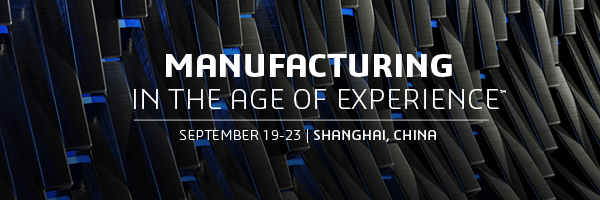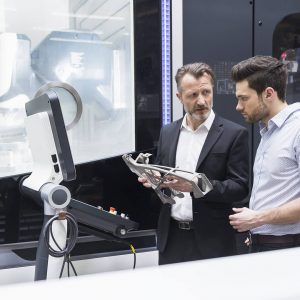
The world is undergoing a global Industry Renaissance that is triggering new business models and new categories of solutions, processes and services that prioritize sustainable innovation and memorable experiences. To compete, businesses must be fast, integrated and agile. Leaders will create value by developing and working within networks to help deliver their products and experiences. All of this requires a flexible, empowered workforce who can quickly create ideas in a virtual world that can be used in the real world of manufacturing.
Dassault Systèmes will explore what the Industry Renaissance means to manufacturers at Manufacturing in the Age of Experience, taking place during the China International Industry Fair (CIIF), September 19-23 in Shanghai. We will feature an array of presentations from business and academic leaders, along with a booth where attendees can experience the future of manufacturing through nine interactive 3DEXPERIENCE exhibits.
The event will explore three emerging themes vital to manufacturers’ success in the Industry Renaissance: Workforce of the Future, Sustainable Innovation & Excellence and Value Networks. We will examine each of these topics in our three-part blog series. Let’s start with Workforce of the Future.
The Industry Renaissance is having a massive impact on the workforce. In 2016, the World Economic Forum predicted that 65% of children entering primary school today will end up working in a job that doesn’t yet exist. To prepare for this shift, manufacturers must plan for and embrace the Workforce of the Future.
Many manufacturing employees are aging out of the workforce. But is anyone there to take their place? Many bright young engineers and professionals are often attracted to working for what they perceive as more cutting-edge companies.

This is happening during a time of major transformation in manufacturing – driven by the Industry Renaissance, digitalization and how the Experience Economy is changing manufacturing from mass production to mass customization.
How do manufacturers anticipate and prepare for future skills and new technology so that they can seize new opportunities? And how do they empower every employee to quickly make decisions and have a positive impact for manufacturers?
Knowledge and know-how are at the heart of empowering the workforce; how an organization harnesses knowledge and know-how determines how well they can empower employees. A platform that supports collaboration, experience sharing and decision making is the lynchpin to harnessing information. Simply put, the platform becomes the mechanism for learning, experiencing, collaborating and taking decisions, much like books did in the past.
At the heart of preparing today for the Workforce of the Future is empowering workers to apply their talents and build new domains of knowledge that can be passed along to the next generation of employees. From centralizing and documenting information and institutional knowledge as well as identifying best practices – or know-how, how manufacturers develop the workforce will impact their ability to be successful in unparalleled ways.
Workforce of the Future builds upon today’s emphasis on operational excellence initiatives executed by companies. Every modern manufacturing company is working on Lean initiatives– in other words, removing waste: any activity that does not add value from the customer’s perspective. This can be in time, materials, energy, etc. – anything that accelerates and improves processes without affecting the product.  This represents a huge opportunity: according to the Lean Enterprise Research Centre, 60% of production activities in a typical manufacturing operation are waste. Putting a business experience platform at the heart of operations will set up future manufacturing employees to leverage their knowledge and know-how in new ways, extending the concepts of lean, continuous improvement, collaboration and critical thinking to tackle increasingly complex challenges.
This represents a huge opportunity: according to the Lean Enterprise Research Centre, 60% of production activities in a typical manufacturing operation are waste. Putting a business experience platform at the heart of operations will set up future manufacturing employees to leverage their knowledge and know-how in new ways, extending the concepts of lean, continuous improvement, collaboration and critical thinking to tackle increasingly complex challenges.
With automation becoming an increasing presence in factories, there is concern among existing and potential workers that they could be replaced by a machine. But, in reality, while entry level and rote jobs may indeed be eliminated, others positions will be created, and still others will become more important as workers will be free to dig into more complex problem solving. Further, the technologies coming into factories may entice more people to pursue a career in manufacturing. With automation taking away some of tedious and manual work, employees from a wider set of backgrounds can find roles in factories: jobs that require problem solving, critical thinking, organizational and analytical skills found in many degreed disciplines. And engineers will have more opportunities for higher value-added work to address the challenges of the future.
During Manufacturing in the Age of Experience in Shanghai, we will explore the trends driving the Workforce of the Future and the technology – specifically platforms – that will enable manufacturers to successfully structure, empower and enable workers now and for the coming decades to improve the efficiency, effectiveness and profitability of their manufacturing operations.
Be sure to come back to check out part two in the series where we will look into Sustainable Innovation & Excellence, and part three which explores Value Networks.

